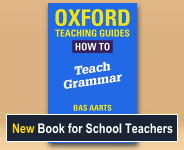Phrasal verbs: New phrasal verbs
There are many phrasal verbs that you won’t find in any dictionary. This is because we commonly create new phrasal verbs based on the meanings of existing phrasal verbs. Usually, new phrasal verbs are either transparent or aspectual – new idiomatic phrasal verbs would usually be too difficult for listeners to decode. Perhaps you’ve heard examples like the following:
- Management’s support or stonewalling will tell you whether you guys should study up or lawyer up. [Washington Post 18/7/2012]
Although both of the above phrasal verbs here are non-standard, new and rare, most native speakers can decode them without much effort. First, we ask if they are examples of transparent phrasal verbs. Can the verb study combine with the directional meaning of the preposition up? Probably not. Can it have an aspectual meaning? Yes. Study up means ‘study completely’, or ‘study thoroughly’. We can follow the same decoding procedure for lawyer up. First, is lawyer a verb? We can understand it to mean ‘get a lawyer’. Can up have a directional meaning? Probably not. Can up have an aspectual meaning? Yes. Lawyer up means something like ‘get a lawyer’ and work with him or her 100%, because you’re going to need it.
- Its members were weird, and I could see how easy it would be to weird out too. [NY Times 15/4/1998]
In this second example, weird can be understood as a verb meaning ‘become weird’. Can this combine with the directional meaning of out? Probably not. But it can combine with the aspectual meaning: ‘to become totally and completely weird’.
Inventing new phrasal verbs is a bit like making a joke, or writing a poem. It requires creativity, and it’s a sort of game that you can play with the language – if you know the rules. Walking through the possible interpretations of these new phrasal verbs shows you just how our minds decode standard phrasal verbs as well.
Welcome!

Englicious is totally free for everyone to use!
But in exchange, we ask that you register for an account on our site.
If you’ve already registered, you can log in straight away.
Since this is your first visit today, you can see this page by clicking the button below.
- Printer-friendly version
- Log in to view or leave comments

